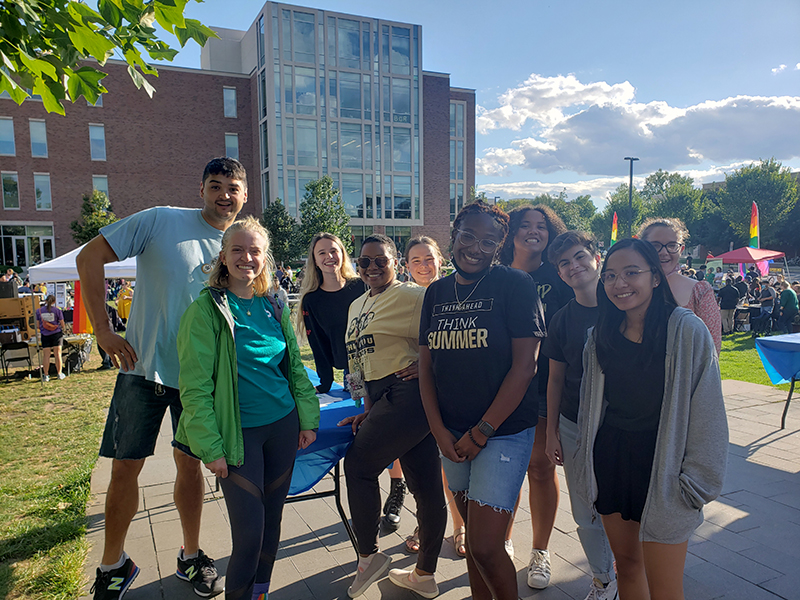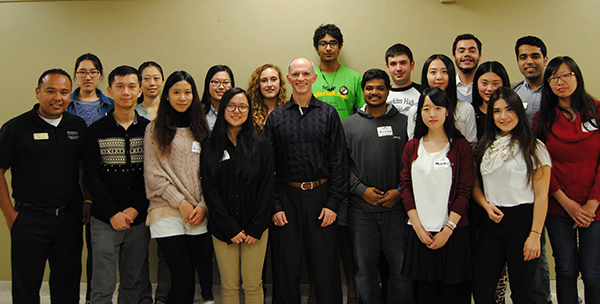
Christopher Cayari (far left) with students at Rainbow Callout, an event hosted by the LGBTQ Center.
For many students, relationships with faculty members are built primarily in academic settings. Attending office hours, asking questions during a lecture or staying after class for a conversation are some of the common ways students interact with faculty. In University Residences, however, faculty are engaging students where they live as part of the Amelia Earhart Faculty in Residence (FiR) program.
FiR integrates faculty members into residential communities to encourage relationship building, provide experiential education opportunities and help students find meaning in their experiences at Purdue. The program honors the legacy of Earhart, who lived among students in the Women’s Residence Hall for three years during the 1930s and gave her time and talents to the residents of her community. Her personal touch and mentorship changed the lives of many women at Purdue.
Christopher Cayari, associate professor of music in the Patti and Rusty Rueff School of Visual and Performing Arts, and Patrick Mosher, a lecturer in the Krannert School of Management, currently serve as FiRs for University Residences. Cayari and Mosher each use their experiences, perspectives and interests to connect with Boilermakers.
Cayari’s interest in an FiR position stemmed from a simple desire – to “do life” with students. Cayari’s initial exposure to residential learning came as a learning community instructor in the Musical Theatre Learning Community. He then became part of the Faculty Fellows program with the Gender Inclusive Learning Community at the recommendation of a colleague. Serving as a FiR was a logical next step for Cayari, who wanted to build even stronger connections with students and connect with campus life.
“The thing I missed most about being a college student was living on campus,” Cayari says. “There’s the energy and bustle of living on campus that appeals to me.”
Mosher, a three-time alumnus of Purdue and a five-time participant in University Residences’ Executive-in-Residence (EiR) program, is attuned to the areas in which he can make the biggest impact. His current venture, Wisdom for Humanity, takes people to sacred places to re-envision their life and share wisdom to build a better world for future generations. The seed for Mosher to serve as a FiR was planted during his most recent EiR visit during spring 2021 and finalized with his appointment as a lecturer in Krannert School of Management. Mosher, who is currently battling stage 4 chronic obstructive pulmonary disease (COPD), saw the opportunity as serendipitous to his life’s work.
“I have a mortality necessity that other people don’t have and I look at that as a blessing – it’s actually a gift,” Mosher says. “I’m very conscious now of the decisions that I make and where I have the most impact. My work is about building a better world for future generations and then I was asked to teach students. I believe the universe is perfect and this was the universe telling me that this is what I needed to do.”
The FiR program doesn’t simply bring a classroom setting to the residence hall. Faculty engage students by actively participating in events and their residential communities alongside students.
Cayari uses his passion for music, theatre and the performing arts to engage with the residents of Parker Halls, Honors College and Residences, and Meredith South – though all students are welcome. Cayari collaborated with colleagues from other universities who were visiting Indianapolis for a drum conference to engage students through “Drum as You Are,” which invited students to participate in music-making and learn music on drums. He has also taken students on trips to Chicago and other universities to watch musical theatre shows and meet members of the cast whom Cayari knows.
Diversity, inclusion and belonging are significant emphases for Cayari as well. Once a month, he invites students, faculty and staff to meet with members of the Faculty of Color Network over lunch.
“The great thing is that we see students and faculty of all races and ethnicities at these events,” Cayari says. “We’re promoting cross-cultural networking as well as talking about our respective experiences at Purdue.”
He has also hosted several events focusing on the LGBTQIA+ community at Purdue, including a collaboration with Drag Artists of Purdue and the Gender Inclusive Learning Community called “reverse trick-or-treating,” where participating students handed out candy in residence halls.
“Reverse trick-or-treating was a wonderful experience for the students in that group who were able to find a community of people that they and I have similar identities to,” Cayari continues.
These events often serve as catalysts for relationships with students that blossom through subsequent interactions. Cayari says he often finds himself interacting with students who attended an event when he sees them elsewhere on campus.
“The students and I start to see each other all over campus,” Cayari says. “We start to build recognition and then we start to find each other. There were people from URBA [University Residences Boiler Apartments] who I met at the CoRec last year. Now, I seem to seem five times in a week. I know them now and we were able to build a relationship. I think that’s exciting.”
For Cayari, being a FiR is about more than hosting events – it’s including students in his daily life and actively participating in the residence hall community. Cayari invites students to join him for daily workouts out the CoRec and enjoys meeting students for meals in the dining halls. He also regularly attends events hosted by RAs, including a karaoke night and a game night. He also enjoys stepping into his “backyard” to check out events happening on Krach Lawn.
“The fun part about being a Faculty in Residence for me is getting to know people, getting to hear students get excited and them being curious,” Cayari says. “I think that’s why students are going to the gym with me – they’re curious about why I do the things that I do. It’s fun to feed their curiosity as well. As they’re asking questions, I get more connected with them, get to know them and hear about their interests.”

